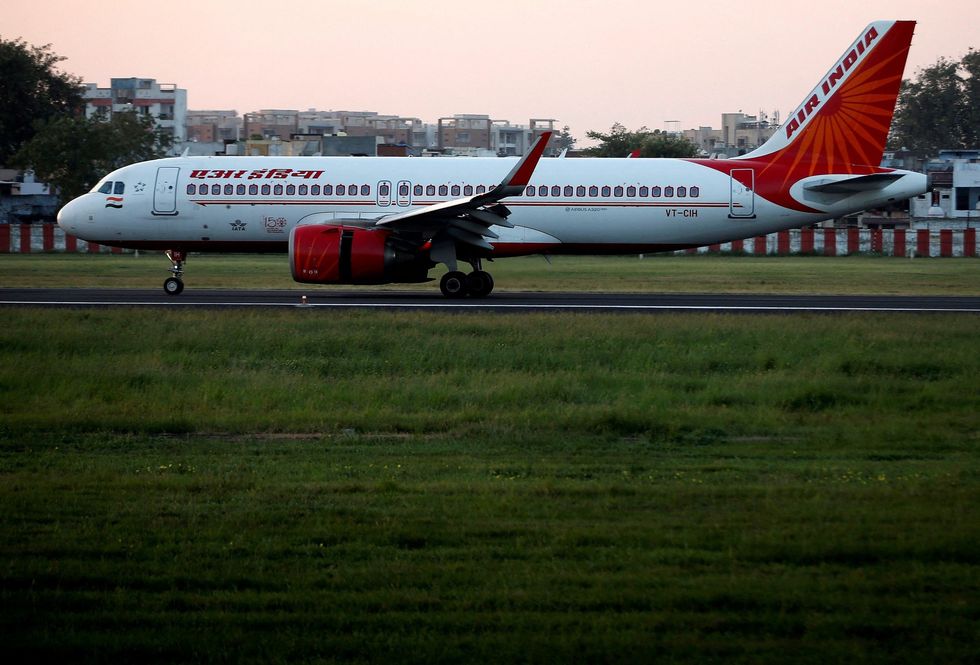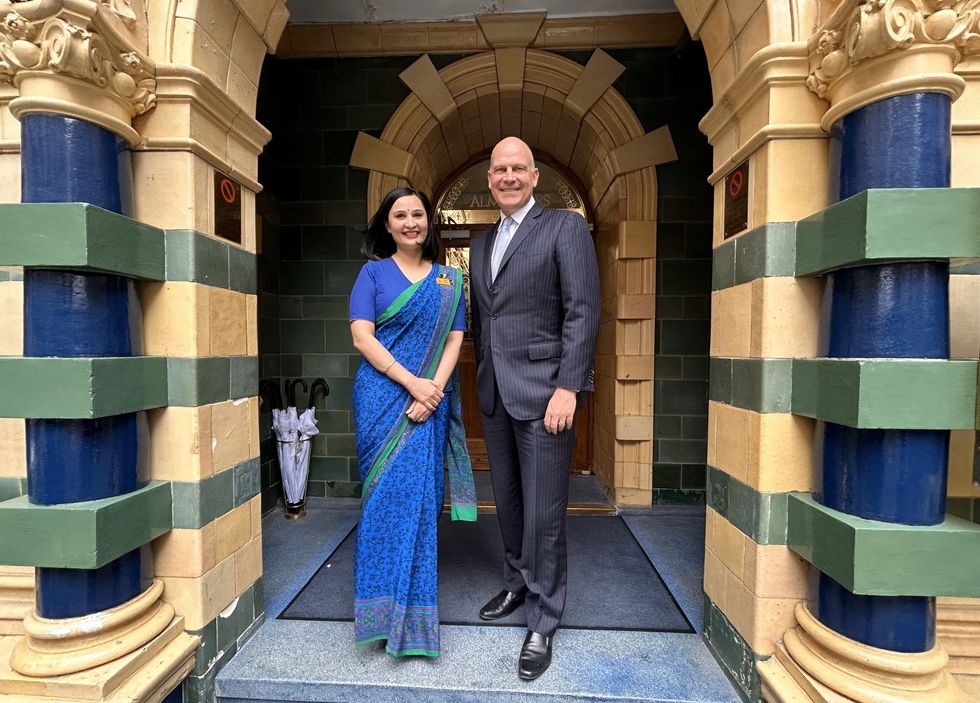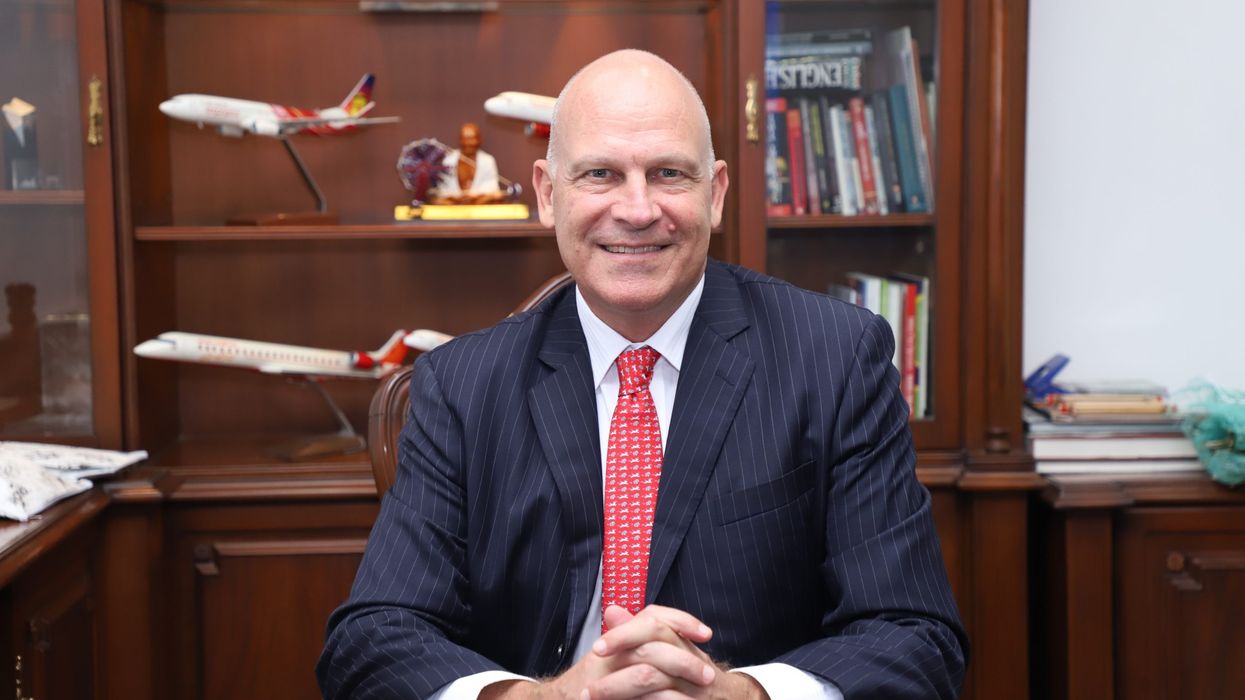WALK into St James’ Court Hotel in central London or the world famous Taj Mahal Hotel in Mumbai, and you know you are entering an establishment to rival the very best on the planet.
Imagine now that this experience of walking into a cocoon of splendour, fine service and opulence could be created anywhere in the world – and once you stepped inside an Air India plane itself.
“It’s a national mission,” Air India CEO Campbell Wilson told Eastern Eye on a recent trip to London. “The ambition is very, very clear.
“It is to reclaim that spot among the upper echelons of global airlines in terms of product, service and reputation.”
Wilson was speaking to Eastern Eye from the grand boardroom in St James’ Court hotel in London SW1.
The common factor is that these hotels and the airline ultimately belong to Tata Sons, one of India’s most respected and best run multinational companies, with interests spanning steel, IT, consumer products and automotives.
In late 2021, Tata Sons took over the loss-making behemoth that is Air India. They appointed Wilson, a New Zealandborn high-flying executive with experience of running both low-cost and fullservice airlines, to become Air India CEO and managing director in May last year. He stepped down from his CEO position at Scoot, a low-cost airline subsidiary of Singapore Airlines.
“Tata is not in this business to be second,” Wilson stated emphatically.
In some ways, it is ironic that Tata has taken over a company it started.
JRD Tata, one of India’s most iconic business titans, acquired a pilot’s licence as a young man and flew a plane between Karachi and Bombay in 1929. The airline’s first scheduled service came into existence in 1932.
Wilson is well aware of the glamour and history of the airline in those days. Even today through its hotel chain, Tata is synonymous with professionalism, good service and luxury.

For around seven decades, Air India was a government-run business after its nationalisation and was part of the state’s furniture – quite literally. In the government’s hands, the once proud reputation Air India enjoyed in its heyday (under JRD) diminished after years of under investment. Restoring that and re-connecting it to the Tata’s is part of the very same challenge, Wilson said.
“Everyone knows the history of the airline under JRD,” he added.
“You have to have confidence in the future and show people [through] actions and investment – whether it’s in aircraft or systems – that we are addressing some of the long-held things people felt were unachievable in terms and conditions, investment and systems, training, performance and management systems.
“Instead of having a siloed organisation, we can bring people together, so we can collectively solve a problem.”
Wilson said he was under no illusions as to the scale of the challenge, likening the mission to that of a start-up.
“Air India is a substantial business undergoing a transformation from the ground up. We’re changing from legacy practices and legacy mindsets into the future, where we’re giving people that extra sense of aspiration, pride and achievement,” he revealed.
Transforming the culture of an organisation that has been in the hands of sleepy government ownership for more than 70 years will take some doing, but Wilson was confident that change was already happening.
“We’re investing heavily in achieving our objectives. We’re focusing on problems and fixing them, and when people see progress, they are encouraged by progress. I think we have created a culture that is less fearful and one where people share ideas.
“Even though Air India hadn’t recruited for so long, the people it has are smart. They knew what they needed to do, but didn’t have the stability or resources. And sometimes they had lost the muscle memory of how to do it. Once you provide this, it’s astonishing how fast cultural transformation and the achievement of outcomes can be.”

Wilson explained that his turnaround plan has three phases – taxi, take-off and climb – and the company is nearing the end of the taxiing phase.
“We’ve been focused on fixing the pain points. Whether it was systems, talent or punctuality, we are resolving many of those so the next two years will be about execution and being a very good airline.”
In February of this year, the airline announced plans to overhaul its ageing fleet of planes, and placed an order for 470 new aircraft at a cost of $70 billion (£55bn) from both Airbus and Boeing.
The plans made global headlines – it was the largest order of its type in history – and was hailed by the UK and India as it would help to stimulate new jobs and expand business between the two countries. Rolls Royce in Derby makes engines for both Airbus and Boeing.
Wilson, surprisingly, eschewed any idea that it was a statement purchase decision – when you throw down an investment gauntlet as a sign of intent.
“It wasn’t,” he told Eastern Eye candidly. “I think we realised it was the biggest order in history after we decided to order. It is not a lie – it was driven by where we see the size of the opportunity and the division between Boeing and Airbus and wide body (broadly, Boeing’s 777 and Airbus’s A380) and narrow body aircraft.
“It’s fundamentally driven by what we see as the opportunity.”
Wilson believes that India can operate as a hub and be a stopping-off point to other destinations, not just in Asia, but to other continents too.
“We can be a stronger player in the transfer traffic market – we can appeal to the international traveller,” he said.
“India can clearly be the flight option – for those going from Europe to Asia, Europe to Australasia, and Asia to Africa, they all cross India. We can appeal to those not just of Indian heritage, but the international traveller too.
“We have fewer than 50 wide body aircraft in the country,” he pointed out. “So clearly, there is a huge upside (coming). And this huge traffic is going via other places (presently), because we didn’t have a proposition to offer.
“So that underpins a lot of the order (of 470 new aircraft). Currently we have only 10 per cent of this share domestically.
“There’s huge opportunity in the shorthaul international [sector] – flights within a four-hour radius (of India) but we need aircraft. To get to a 30 per cent international market share and 30 per cent domestic share needs a lot of aircraft.”
He said there were opportunities both in the business travellers as well as the leisure flyers markets.
“The full-service business will be positioned increasingly upwards – there will be investment in seats and inflight entertainment, catering, service, punctuality and a frequent flyer programme. And it will be on par with any of the top-tier airlines in the world.”
Over the years, Air India has lost considerable market share to Middle Eastern airlines, with much of the south Asian diaspora now preferring these airlines to travel to India.
Wilson is hoping to attract the diaspora back with more frequent flights to destinations like Amritsar and Ahmedabad (see box below) and a complete overhaul of the flying experience.
‘We’ll be offering a non-stop service – we’re not forcing you to stop for three to four hours in the middle of the night. And in terms of product quality, inflight entertainment, quality of seats, it will be equivalent or better in terms of service experience,” he argued.
The transformation process will also see a complete rebranding, the details of which Wilson was not quite ready to reveal. But he said it would showcase the confidence of a new airline that sets it apart from the old Air India.
Wilson reinforced the importance of culture change. The airline is now in the Tata’s control, one of India’s most principled and successful business groups.
“It is professional, focused on quality, and has very, very strong values, with high aspirations, second to none,” he said. “That is the culture I see at Tata and that is what I want to have at Air India.
“Indians know this culture better than me – and I think there was a sigh of relief when Tata acquired Air India.
“It isn’t probably for me to say, but I think we’re not just talking the talk, but walking the walk.”
‘We will grow at Gatwick’
FOR the first time, Air India is flying from London Gatwick as part of its ambitious modernisation programme.
Campbell Wilson, the Air India CEO and managing director, explained why the airline is now offering direct services to Kochi (Cochin), Ahmedabad and Amritsar from Gatwick.
“The UK is a very important market for us,” Wilson said. “We want to increase the frequency but there are obviously constraints on aircraft and the pace of our own rate of growth.
“What we’re seeing now is really only the start of what we ultimately want to do.
“We are improving services from 44 to 49 a week – slightly more than 10 per cent. We’re using our Heathrow slots to allow for maximum frequency between Heathrow and Mumbai and Delhi – which are corporate business-orientated routes and we need that frequency for the business traveller.”
The airline has therefore shifted its previous flights from Heathrow to Kochi, Ahmedabad and Amritsar to Gatwick. “It is more leisure orientated and allows for expansion that we simply couldn’t do from Heathrow,” Wilson clarified.
He also confirmed that more flights are likely to appear from Gatwick in the future.
“It’s more likely that we will grow at Gatwick rather than anywhere else – it’s largely driven by aircraft availability.”
The new services from Gatwick began last Monday (27). Air India also offers flights from Birmingham to Amritsar and Ahmedabad.




